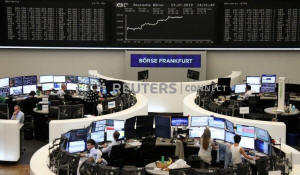Trade talks keep stocks afloat, weak PMIs sink euro
 Send a link to a friend
Send a link to a friend
 [July 24, 2019]
By Ritvik Carvalho [July 24, 2019]
By Ritvik Carvalho
LONDON (Reuters) - Global shares crept
higher on Wednesday as prospects of fresh China-U.S. trade talks drew a
guarded welcome from investors, while dour data on euro zone economic
activity hit the euro ahead of a European Central Bank policy meeting.
Downbeat earnings as well as weaker-than-expected purchasing manager
surveys in France and Germany took European shares and the euro a leg
lower, with the single currency hitting two-month lows.
MSCI'S All-Country World index of stocks extended its previous day's
gains by a whisker, rising 0.02%.
Broad sentiment was boosted by a Bloomberg report that U.S. Trade
Representative Robert Lighthizer would travel to Shanghai next week for
meetings with Chinese officials.
White House economic adviser Larry Kudlow on Tuesday called it a good
sign and said he expected Beijing to start buying U.S. agriculture
products soon.
Chinese blue chips climbed 0.8% while MSCI's broadest index of
Asia-Pacific shares outside Japan gained 0.1%.

"While the resumption of trade talks appears to mitigate any near-term
deterioration in US-China tensions, prudent investors will not get
carried away, seeing as a meaningful deal still seems a long way off,"
said Han Tan, market analyst at FXTM.
Stocks are just a whisker away from all-time highs, buoyed by
expectations of a wave of policy stimulus by global central banks and a
resulting sharp decline in bond yields.
The ECB is thought likely to at least offer a nod to easier policy at
its meeting on Thursday.
Futures remain 100% priced for a rate cut of 25 basis points from the
Federal Reserve next week, and even imply an 18% chance of 50 basis
points.
The prospect of widespread central bank largesse helped take the sting
out of a downgrade to the IMF's global growth forecasts.
"There are two conflicting catalysts for stock traders right now: on one
hand, central banks around the world are about to embark on an easing
initiative...," said Konstantinos Anthis, head of research at ADSS.
"On the other though, the slowdown in growth on a global scale and
various geopolitical factors keep weighing down on corporate
profitability, asking questions on whether equities have peaked."
EUROGLOOM
The dollar got a hand-up from a deal to end a deadlock over the U.S.
budget, with the index that measures it against a basket of other
currencies up 0.05%.
[to top of second column]
|

The German share price index DAX graph is pictured at the stock
exchange in Frankfurt, Germany, July 23, 2019. REUTERS/Staff/File
Photo

The euro hit two-month lows at $1.1127, falling further after the
weak PMIs. It also hit a near seven-month trough against the yen at
120.19 though it recovered from a two-year low versus the Swiss
franc.
A recession in Germany's manufacturing sector worsened in July with
the performance of goods producers dropping to the lowest level in
seven years while French business growth slowed unexpectedly, the
purchasing manager surveys showed.
Sterling rose 0.1% to $1.2452 having fallen for three sessions in a
row as the Brexit outlook got ever murkier.
Boris Johnson will become Britain's new prime minister on Wednesday,
with investors unclear as to whether he will lead the country to a
no-deal EU exit or find a compromise.
"We believe that in the short term the market is overstating the
risk of a no deal," said Mark Haefele, chief investment officer at
UBS Global Wealth Management.
"While a no-deal Brexit remains possible over the longer term, our
view is that the most likely path in the short term is for a further
extension to the UK's 31 October exit day, either due to a change in
stance from PM Johnson, or in the case of a general election."
Gold gained nearly half a percent to $1,423.65 per ounce, though it
was still short of last week's peak of$1,452.60.
Oil prices nudged higher on rising tensions over Iran, a sharp fall
in U.S. crude stocks and positive signs on Sino-U.S. talks, although
worries about weak demand kept a cap on gains.
Brent crude futures added 0.2 percent to $63.96, while U.S. crude
rose 0.4% to $56.99 a barrel.
(Reporting by Ritvik Carvalho; editing by John Stonestreet)
[© 2019 Thomson Reuters. All rights
reserved.]
Copyright 2019 Reuters. All rights reserved. This material may not be published,
broadcast, rewritten or redistributed.
Thompson Reuters is solely responsible for this content.
 |